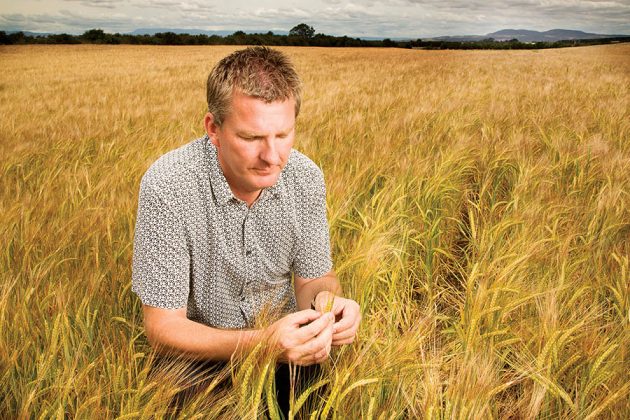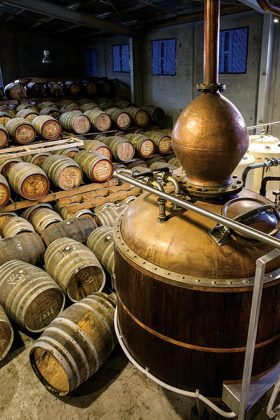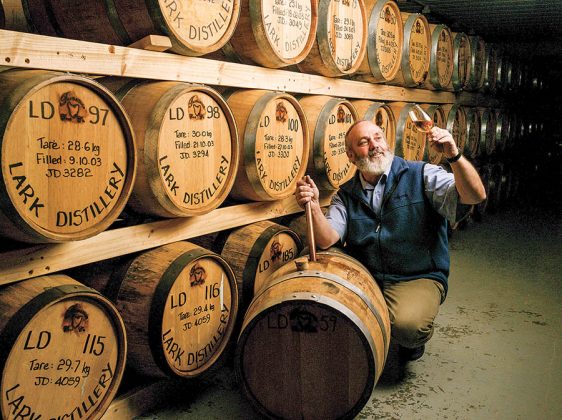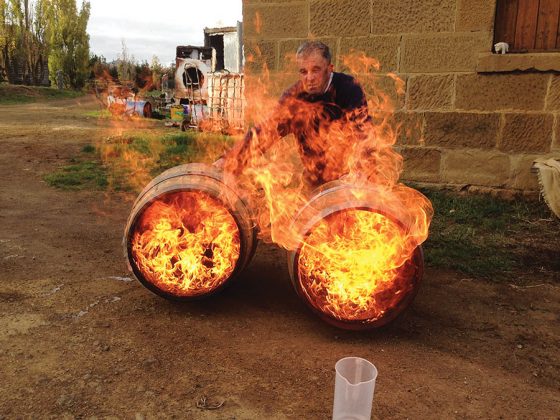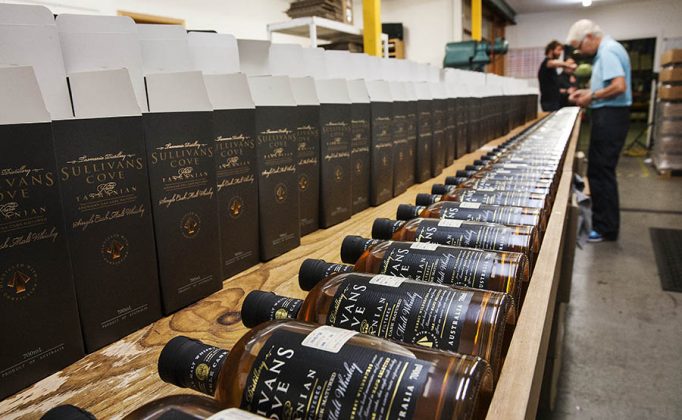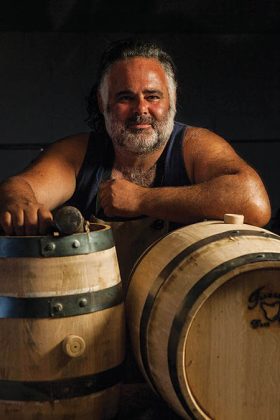The former colony of Van Diemen’s Land—as the small, fertile island off Australia’s southeast coast was originally known—once boasted about 16 distilleries, largely located in and around the main towns of Hobart and Launceston. The distillers of the early 19th century, who brought their skills with them to the island colony—whether by dint of the king’s pleasure or as free settlers from their native Scotland or Ireland—found pristine air, sparkling water and rich earth to support their crops of barley. Being a penal colony though, there was concern regarding an excess of locally distilled spirit, and so, allegedly at the behest of the governor’s wife, a law passed banning whiskey distilling as of January 1, 1839.
Thus it remained for more than 150 years. Legislation passed repealing the prohibition in 1992, and regulations changed to allow whiskey distilling in Tasmania. In the meantime, regulatory responsibility had moved from the individual colonies/states to the federal authorities in Canberra. Fortunately, the regulatory regime for making whiskey is less exacting in Australia than other producing countries, a factor which encourages innovation.
These same three components of clean water, fresh air and fertile soil were still present when the new breed of distiller appeared in the early 1990s. Without them, Tasmania’s whiskey resurgence would not have happened. A small number of individuals recommenced whiskey making on the island. A key player was consultant/distiller Brian Poke, who was responsible for the development of Cradle Mountain whiskey from as early as 1989.Three other names—Bill Lark, Patrick Maguire and Casey Overeem—stand out in terms of inspiration, innovation and perseverance. They ensured that Tasmanian whiskey went from being an experimental craft or hobby to a profitable industry, and eventually achieving international recognition for excellence.
These pioneers have—together and individually—put Tasmania on the world whiskey map. Each has produced his own brand and style, which are eminently distinctive, combining to create a recognizable separate Tasmanian category within the wider genre of Australian whiskey.
Lark Distillery
By reputation alone, one has to start with the Lark Distillery, which follows traditional malt-whiskey distilling practices. It was founded in 1992 by Bill and Lyn Lark, whose daughter Kristy was the distiller for a number of years. Bill Lark’s vision for producing Tasmanian malt whiskey was born on a trout-fishing trip in the highlands of Tasmania. His father-in-law Max produced a wonderful bottle of single malt (identity undisclosed), and as they enjoyed a drink in the park at Bothwell, surrounded by Georgian buildings, barley fields and the gentle flowing of the Clyde River, Bill remarked to Max, “I wonder why there isn’t anyone making malt whiskey in Tasmania.” That simple story has become legend and, as they say, the rest is history. The company remained the Larks’ personal property until November 2013, when they invited in a group of investors to form Lark Distillery Pty. Ltd. The Larks still maintain an interest, but Bill is now more ambassadorial than hands-on. The essential continuity is further enhanced by Chris Thomson, who joined the company in 2007, became head distiller in 2010 and has been involved in over three-quarters of Lark’s total production to date.
Lark produces approximately 50,000 liters (13,209 gallons) per year, using two traditional copper pot stills: a 600-liter (159-gallon) spirit still and a 1,800-liter (476-gallon) wash still. The stills were built locally by Peter Bailey of Knapp Lewer Contracting, which enjoys a near monopoly of supplying such equipment to the Tasmanian distilling industry. Lark matures most of their spirit at the distillery at Cambridge, near Hobart, using French oak 100-liter (26-gallon) used, port and sherry casks, which come from Seppeltsfield Winery in the renowned winegrowing area of the Barossa in South Australia. The winery maintains a cooperage onsite.
Lark Distillery won the “Best World Whisky” category in the 2014 International Whisky Competition (Chicago), with gold medals for both Lark Distiller’s Edition and Lark Single Malt Whisky. Lark Cask Strength also took the top award for the “Best Cask Strength Whisky,” giving them a total of three gold medals for three different whiskeys across the competition.
Tradition and innovation go hand in hand at Lark, and there are always exciting variations appearing, the latest of which is the Whisky Magazine Hall of Fame limited release. Drawn from a 53-gallon Heaven Hill ex-bourbon cask and finished in a 90-year-old Seppeltsfield Para Port cask, Lark bottled this expression unfiltered, at cask strength, producing a mere 220 bottles. The special release commemorates Bill Lark becoming the first person from the Southern Hemisphere to be named to the Whisky Magazine Hall of Fame.
Tasmania Distillery (Sullivans Cove)
After somewhat mixed beginnings, Tasmania Distillery’s Sullivans Cove brand under Patrick Maguire has won numerous awards. His special release French Oak cask HH525 was voted the World’s Best Single Malt Whisky at the 2014 World Whisky Awards.
New premises, soon to be enhanced by a second still to serve as the wash still, are evidence of the brand’s success. Unlike most Tasmanian whiskeys, Sullivans Cove goes for longer periods of maturation—between 10 and 13 years—and uses 200- and 300-liter (53- and 80-gallon) casks, where its compatriots tend to rely on smaller barrels with less time in oak. The current site is the distillery’s fourth location and has a visitors’ center in keeping with the industry’s alliance with Tasmanian tourism.
The Overeem Distillery (formerly Old Hobart)
Overeem—founded as Old Hobart in 2005—has shared common ownership with Lark since January 2014, which reflects the long-standing friendship and close association between Bill Lark and Casey Overeem. Overeem first picked up the distilling bug from his wife’s relatives in Norway who practiced micro-distilling in their basements. Casey soon started experimenting back in Hobart, and a fine malt whiskey eventually emerged.
Overeem retains its own strong following, and Casey’s daughter, Jane, who is now marketing manager for both Lark and Overeem, will ensure that the latter continues to flourish.
Around this coterie of Tasmanian whiskey icons, other distilleries are thriving and breaking new ground. Although most of the nine distilleries currently in production follow the traditional pot-still malt-whiskey model of their Scottish forefathers in terms of chemistry and technology, there are exceptions.
Hellyers Road in the north and Nant in the Tasmanian “highlands” are important producers with serious backing behind them and have done much to extend the reach of the Tasmanian category. At the other end of the spectrum, there is the unique paddock-to-bottle rye whiskey operation at Belgrove Distillery, the recently-relocated Redlands Estate distillery, William McHenry and Sons Distillery resting on the side of Mount Arthur, and Shene Estate & Distillery (formerly Mackey’s Distillery), which uniquely follows the Irish triple distillation model.
Belgrove is of particular interest on two counts. First, it is the only rye whiskey distillery in Tasmania. The entire process—from growing the grain to bottling the product—happens on the same property at the hands, more or less, of a single individual, Peter Bignell, who also practices an imaginative means of delivering an environmentally responsible method of distillation. Remarkably, his farm and distillery equipment are entirely bio-fueled, using waste cooking oil from a nearby fish and chip shop! All of the water used in production comes from rainfall captured on the roofs of the various farm and distillery buildings, although there are also springs on the property, which could be pressed into use if needed. Moreover, the residual pulp from the distilling process is fed to his sheep, which love it as an alternative to their normal feed. Some of their dung ends up under the shearing shed pens. Bignell’s latest fun experiment is to burn some of the dried dung to smoke malted rye. He says it offers quite a soft, almost-sweet smoke, not at all offensive. They, in turn, provide fertilizer for the next crop of rye!
With at least six new distilleries in the making, the prospect of an ever-growing range of Tasmanian expressions is relishing. One such is Corra Linn near Launceston, brainchild of John Wielstra, with some technical help from distiller/consultant extraordinaire, Brian Poke, who was involved in the early years of Tasmania’s whiskey revival. He helped found both Cradle Mountain and Hellyers Road distilleries. Cradle Mountain closed a number of years ago but is re-emerging in a different location. There is even talk of opening a new distillery (using the original Cradle Mountain equipment) on windswept King Island in the stormy Bass Strait, off Tasmania.
Corra Linn is particularly exciting, as it will be the first to use an entirely new local barley strain, called Macquarie, developed over a period of 10 years and containing less ethyl carbamate. The still, which was installed in December 2015, is a versatile reflux column still and was professionally designed and produced in China under the owner’s careful oversight. The result is a beautifully fashioned copper, fish-scale finished, crafted masterpiece. Other factors of distinction are the use of a furnace to biscuit-malt the barley, and “smoking” using Tasmanian kelp instead of peat as an ingredient in creating Corra Linn single malt whiskey—when it appears.
All distilleries are members of the Tasmanian Whisky Producers Association. It has done much to promote and strengthen the Tasmanian brand and establish Tasmania as Australia’s “Whisky Island.” Getting legislative recognition of a Tasmanian whiskey appellation and geographic identity will be logical and pressing objectives for the Association in driving home what has already been achieved in terms of putting Tasmania on the world whiskey map.
Will Tasmania ever be able to meet the growing demand from the legions of whiskey enthusiasts looking for the latest in distilled perfection? Just as in a maturing barrel of whiskey, only time will tell.
Whiskey Distilleries in Tasmania
Belgrove Distillery
3121 Midland Highway
Kempton, Tasmania
7030 Australia
+61 409 144 560
info@belgrovedistillery.com.au
belgrovedistillery.com.au
Tasmania’s only rye whiskey, oat
whiskey and non-whiskey spirits.
Hellyers Road Distillery
153 Old Surrey Road
PO Box 1415
Burnie, Tasmania 7320 Australia
+61 3 6433 0439
sales@hellyersroaddistillery.com.au
hellyersroaddistillery.com.au
A range of single malt whiskeys, a cream liqueur and vodka.
Lark Distillery
Lark Cellar Door & Whisky Bar
14 Davey Street
Hobart, Tasmania 7000 Australia
+61 3 6231 9088
info@larkdistillery.com.au
larkdistillery.com
Malt whiskeys and other spirits
and liqueurs.
McHenry & Sons Distillery
229 Radnor Road
Port Arthur, Tasmania 7182 Australia
+61 03 6250 2533
williamfmchenry@gmail.com
mchenrydistillery.com.au
Single malt whiskey to be released in 2016, currently bottles 10-year-old Sullivans Cove under Three Capes label, a range of vodkas and gins.
Nant Distilling Company
River Office, River Level, Brisbane Powerhouse
119 Lamington Street
New Farm, Queensland, Australia
+61 1 800 746453
nant.com.au
media@nant.com.au
sales@nant.com.au
A range of single malt whiskeys.
Overeem Distillery (formerly Old Hobart)
Overeem & Lark Distillery
14 Davey Street
Hobart, Tasmania 7000 Australia
+61 3 6231 9088
info@overeemwhisky.com
overeemwhisky.com
A range of single malt whiskeys.
Redlands Distillery
Redlands Distillery
Dysart House
26 Main Street
Kempton,
Tasmania 7030 Australia
PO Box 35
Kempton, Tasmania 7030 Australia
+61 3 6259 3058
emma@redlandsestate.com.au
redlandsestate.com.au
A single malt whiskey, other spirits and liqueurs.
Shene Estate and Distillery (formerly Mackey Distillery)
Shene Estate
76 Shene Road
Pontville, Tasmania 7030 Australia
+61 0408 020 007
info@shene.com.au
shene.com.au
A triple-distilled malt whiskey and Poltergeist gins.
Tasmania Distillery
1/10 Lamb Place
Cambridge, Tasmania 7170 Australia
+61 03 6248 5399
office@tasmaniadistillery.com.au
sullivanscovewhisky.com
Sullivans Cove brands of single malt whiskeys and other spirits and liqueurs.
Corra Linn Distillery
93 Correa Drive
Relbia, Tasmania, Australia
Phone: +61 418 135 150
john@corralinndistillery.com.au
corralinndistillery.com.au
Single malt whiskey.
Fannys Bay Distillery
Mathew and Julie Cooper
15 Seascape Drive
Lulworth, Tasmania 7252, Australia +61 402 624 793
recooperate@live.com.au
facebook.com/fannysbay
Single malt whiskey to be released in 2017.
Launceston Distillery
PO Box 525
Prospect, Tasmania 7250 Australia
info@launcestondistillery.com.au
launcestondistillery.com.au
Single malt whiskey to be released in 2017.

